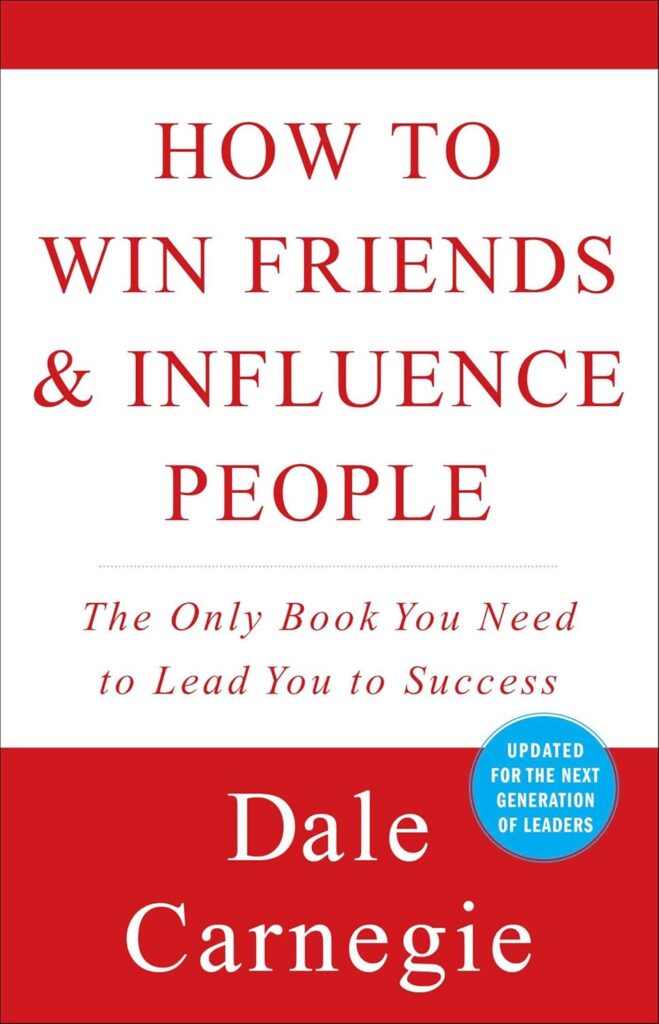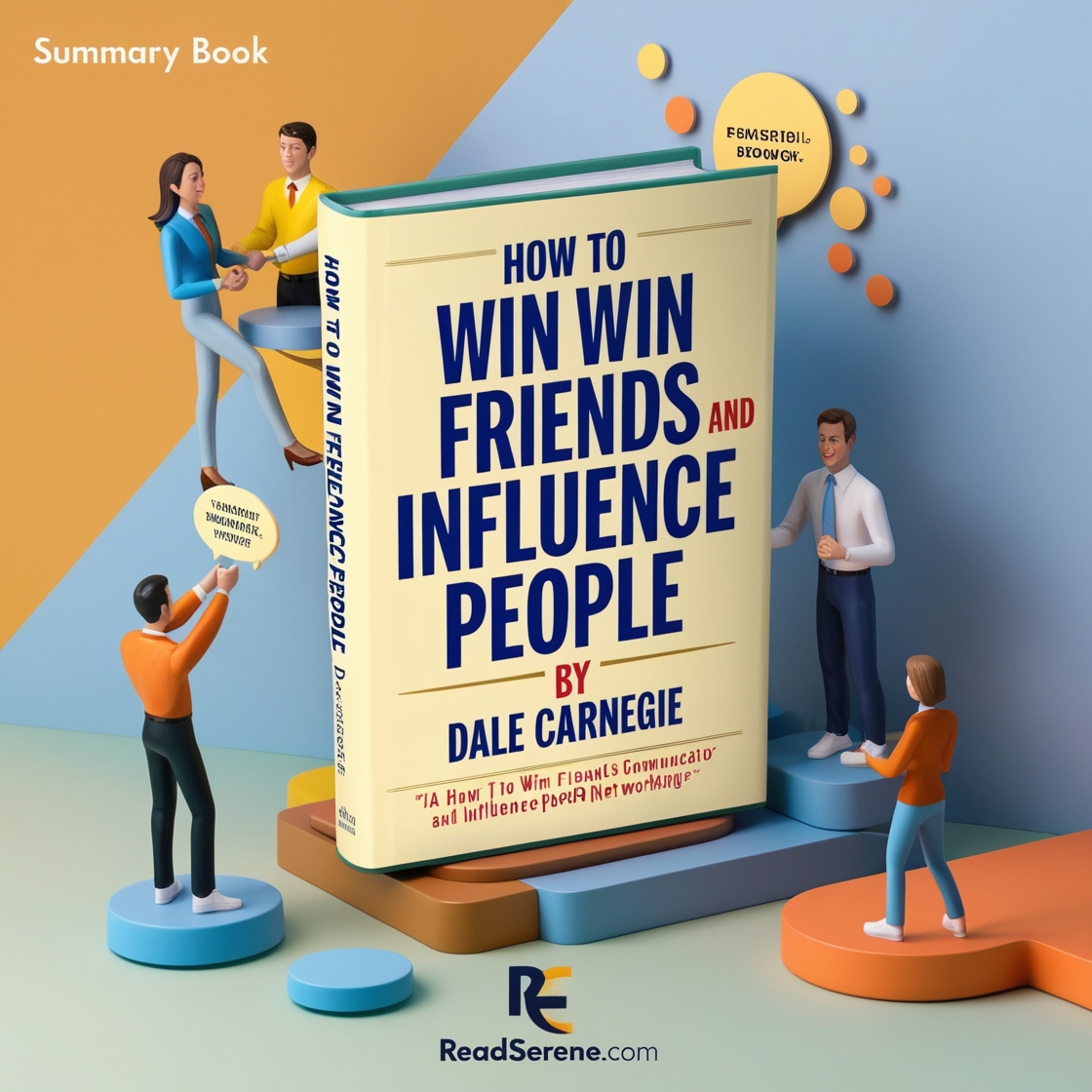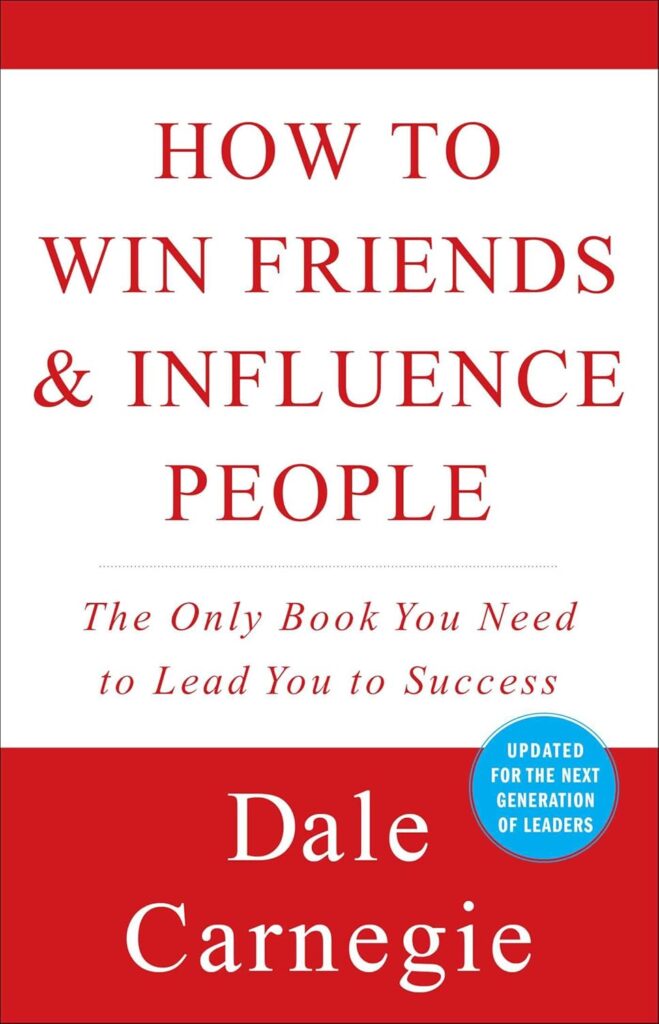Introduction
Have you ever wondered how some of the most successful people in the world think and act? How to Win Friends and Influence People by Dale Carnegie holds the key to unlocking powerful strategies for success, relationships, and personal growth. In this detailed summary, we’ll break down the core lessons and key takeaways from the book that can transform your life, career, and relationships.
1. Overview of How to Win Friends and Influence People:
How to Win Friends and Influence People is a transformative guide written by Dale Carnegie that explores the concept of human relations and effective communication. Whether you’re a seasoned professional or just beginning your journey, this book offers invaluable insights into how building better relationships and mastering influence can impact various areas of your life, from decision-making and emotional intelligence to personal and professional growth. With actionable strategies and thought-provoking exercises, this book is a must-read for anyone looking to make positive changes in their life.
2. Key Takeaways and Lessons:
Chapter 1: If You Want to Gather Honey, Don’t Kick Over the Beehive
In this chapter, Dale Carnegie introduces the importance of avoiding criticism when dealing with others. Criticism breeds resentment and often closes the door to positive interaction. Instead, encourage and lead others with patience and empathy.
Key Point:
Treat others with respect and understanding to build trust and rapport.
Chapter 2: The Big Secret of Dealing with People
Carnegie emphasizes the power of showing genuine appreciation for others. Everyone wants to feel important and valued, and by offering sincere praise, you can win people over.
Key Point:
Acknowledging others’ worth is a key to creating lasting relationships.
Chapter 3: He Who Can Do This Has the Whole World with Him. He Who Cannot Walks a Lonely Way
This chapter delves into the importance of arousing in others an eager want. Carnegie shares how effective communication is about focusing on the other person’s desires and needs rather than your own.
Key Point: Understanding the desires of others helps you better influence and guide them.
Chapter 4: Do This and You’ll Be Welcome Anywhere
Here, Carnegie discusses the power of showing genuine interest in others. Asking questions, listening actively, and showing curiosity about people’s lives can establish a strong connection.
Key Point:
People appreciate when you take a sincere interest in them, which leads to stronger bonds.
Chapter 5: A Simple Way to Make a Good First Impression
Carnegie stresses that a smile is a powerful tool in making a good first impression. A warm, genuine smile can make people feel comfortable and welcome.
Key Point:
A smile is a universal gesture that helps break the ice and set a positive tone.
Chapter 6: If You Don’t Do This, You Are Headed for Trouble
In this chapter, the author emphasizes the importance of remembering people’s names. Carnegie argues that a person’s name is the sweetest sound they can hear, and using it shows respect.
Key Point:
Remembering and using someone’s name is one of the easiest ways to make them feel valued.
Chapter 7: An Easy Way to Become a Good Conversationalist
Dale Carnegie explains that being a good listener is the key to good conversation. People enjoy talking about themselves and their interests, so give them the chance to do so.
Key Point:
Listening attentively can make you a more interesting conversationalist.
Chapter 8: How to Interest People
In this chapter, Carnegie explores how to make your conversations more engaging by talking about topics the other person cares about.
Key Point:
Tailor conversations to the interests of others to capture their attention.
Chapter 9: How to Make People Like You Instantly
Carnegie’s main point here is that the fastest way to win people over is by making them feel important and doing so sincerely.
Key Point: Sincere appreciation and interest in others can instantly make them like you.
Chapter 10: A Formula That Will Work Wonders for You
Here, Carnegie discusses how to avoid arguments and win people over by focusing on finding common ground.
Key Point: Focus on agreement, not disagreement, to foster cooperation.
Chapter 11: What Everybody Wants
Carnegie emphasizes that people desire to feel understood and appreciated. In this chapter, he explains how to make others feel important by expressing genuine interest in their perspectives.
Key Point: Recognizing others’ contributions and feelings helps build stronger relationships.
Chapter 12: The Secret of Socrates
This chapter introduces the Socratic method, which involves asking questions to help others come to their own conclusions. By engaging others in dialogue, you guide them toward the right decisions without directly telling them what to do.
Key Point: Asking questions allows others to feel empowered while also guiding them to a solution.
Chapter 13: The Safety Valve in Handling Complaints
Carnegie provides insight into handling complaints effectively by allowing the other person to express their concerns fully before offering a solution.
Key Point: Listening empathetically to complaints and validating others’ feelings can resolve conflicts.
Chapter 14: How to Get Cooperation
This chapter explains how to gain cooperation from others by making them feel like they are part of the solution. When people feel involved, they are more likely to participate willingly.
Key Point: Involve others in decision-making to encourage cooperation.
Chapter 15: A Sure Way of Making Enemies—and How to Avoid It
Carnegie warns against criticizing or condemning others, as this can create enemies. Instead, focus on offering constructive feedback and making others feel valued.
Key Point: Positive reinforcement and empathy can prevent conflict and build stronger connections.
Chapter 16: A Formula That Will Work Wonders for You
In this chapter, Carnegie emphasizes the power of letting others save face. When people feel respected, they are more likely to cooperate with you in the future.
Key Point: Helping others maintain dignity can lead to long-term respect and collaboration.
3. How This Book Will Help You:
By implementing the actionable steps in How to Win Friends and Influence People, you will start to notice profound changes in the way you approach challenges and opportunities. Whether you want to improve your career, enhance your relationships, or just build more self-confidence, the insights shared by Dale Carnegie are guaranteed to help you succeed. Not only will you gain valuable tools for personal development, but you will also learn how to approach life with a fresh, empowered mindset.
4. Additional Benefits:
In addition to its actionable advice, How to Win Friends and Influence People offers practical exercises to help you track your progress. These exercises will guide you step-by-step through applying each lesson in your own life. Whether you’re looking to refine your communication skills or improve your decision-making, the tools in this workbook will help you stay on track.
5. Why You Should Buy the Book:
While this summary provides a glimpse into what you can expect from How to Win Friends and Influence People, there’s no substitute for reading the book in full. The complete version offers more in-depth insights, additional real-life examples, and actionable advice that can truly help you make lasting changes in your life. By purchasing the book through this link, you’ll be supporting ReadSerene.com, allowing us to continue providing quality book recommendations and summaries.
Call to Action:
Don’t miss out on the chance to unlock the life-changing wisdom in How to Win Friends and Influence People! Click the link below to buy your copy on Amazon today and start your journey toward better relationships, success, and personal growth.
FAQs:
What is How to Win Friends and Influence People about?
It’s about mastering the art of communication, leadership, and relationship-building. Dale Carnegie shares proven strategies to help you connect with others, influence decisions, and foster positive interactions.
Who should read How to Win Friends and Influence People?
This book is for anyone who wants to improve their social skills, build stronger relationships, and enhance their influence in personal or professional settings.
What are the main takeaways from the book?
Key takeaways include the importance of listening, showing appreciation, understanding others’ desires, and leading through empathy.
How can I benefit from this book?
By applying its principles, you’ll gain better communication skills, develop more meaningful relationships, and improve your career and personal life.
Where can I purchase How to Win Friends and Influence People?
You can buy it on Amazon through our affiliate link! click here

What are the top 10 most read books?
- Harry Potter series – J.K. Rowling 44% off
- The Lord of the Rings – J.R.R. Tolkien -54% off
- The Alchemist – Paulo Coelho -35% off
- The Da Vinci Code – Dan Brown -39% off
- Think and Grow Rich – Napoleon Hill -22% off
- 1984 by George Orwell -66% off
- Pride and Prejudice – Jane Austen -42% off
- To Kill a Mockingbird – Harper Lee -43% off
- The Little Prince – Antoine de Saint-Exupéry -28% off
- Don Quixote – Miguel de Cervantes -30% off
Conclusion:
In conclusion, How to Win Friends and Influence People by Dale Carnegie is more than just a book; it’s a timeless guide to improving your relationships, communication, and overall approach to life. With its practical lessons and actionable strategies, this book offers invaluable tools that can help you become a more influential and likable person, both personally and professionally. Whether you’re looking to boost your career, strengthen your relationships, or simply become a better communicator, Carnegie’s insights are sure to have a lasting impact.If you’re ready to transform your life and unlock the secrets to success and influence, How to Win Friends and Influence People is a must-read. Don’t miss out on the opportunity to apply these powerful principles to your own life. Click the link below to purchase your copy today and start your journey toward becoming the best version of yourself.


